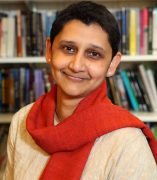
Gayatri Reddy
Associate Professor of Gender & Women's Studies, Global Asian Studies, and Anthropology
About
Gayatri Reddy is an anthropologist, feminist, writer, and teacher. She got her B.A from the University of Delhi, her Masters’ in Public Health and her Ph.D in Anthropology from Emory University. She is a currently an Associate Professor of Gender and Women's Studies, Global Asian Studies, and Anthropology at the University of Illinois Chicago. Her research, teaching and community engaged work lie at the intersections of sexuality, gender, race, and the politics of subject and community formation in India and the Indian diaspora. She is the author of With Respect to Sex: Negotiating Hijra Identity in South India (University of Chicago Press, 2005), an ethnography of hijras, the so-called “transgender” community in India. Like the larger corpus of her work, this book locates such figures of sexual difference, and the domain of sexuality more generally, within a broader field of social difference, exploring the intersections of gender and sexuality with religion, race, ethnicity, and class in South Asia and its diaspora. More recently, she has begun a research project exploring the contextual meanings of blackness in contemporary India through the lens of Indian Ocean world “African” migrations to India in the wake of slavery’s abolition. Tracing these historical routes and geopolitical mappings through the prism of masculinity, this project historically and ethnographically explores the complex ways in which race, blackness, and masculinity are constructed both through global as well as local contours of difference, to shape contemporary belonging. Finally, she is also working on a public history project in Chicago (with Anna Guevarra), visualizing displacements of people and struggles over land, housing, and community stemming from urban renewal policies in the northside Chicago neighborhood of Uptown. The project draws on long histories of intentional place-making, multiracial solidarity, and working-class resistance to such policies, raising critical questions about how we understand urban “development” or renewal, who this development is for, and how it is structured.